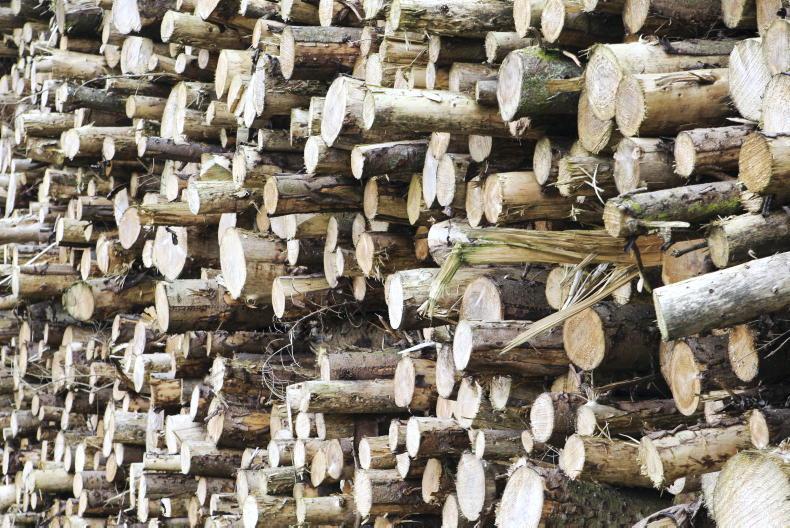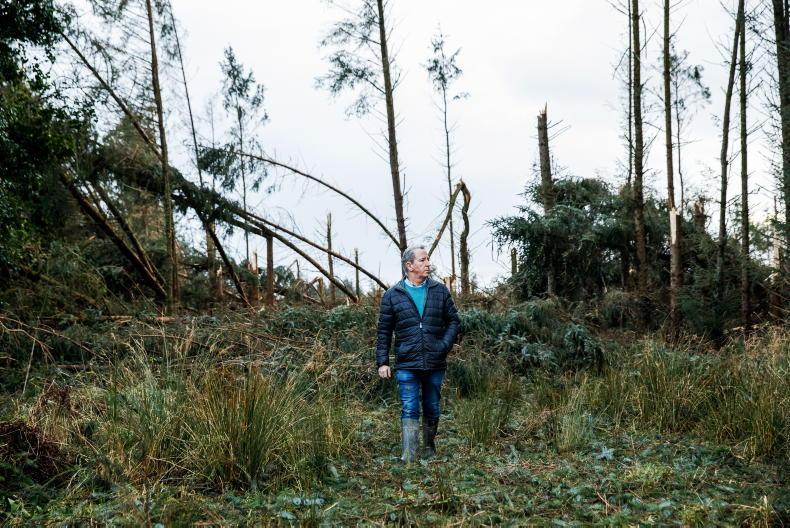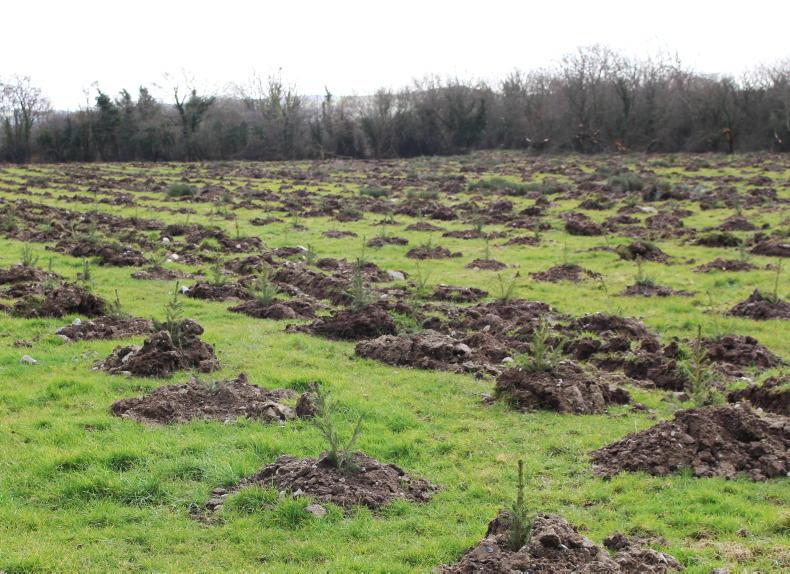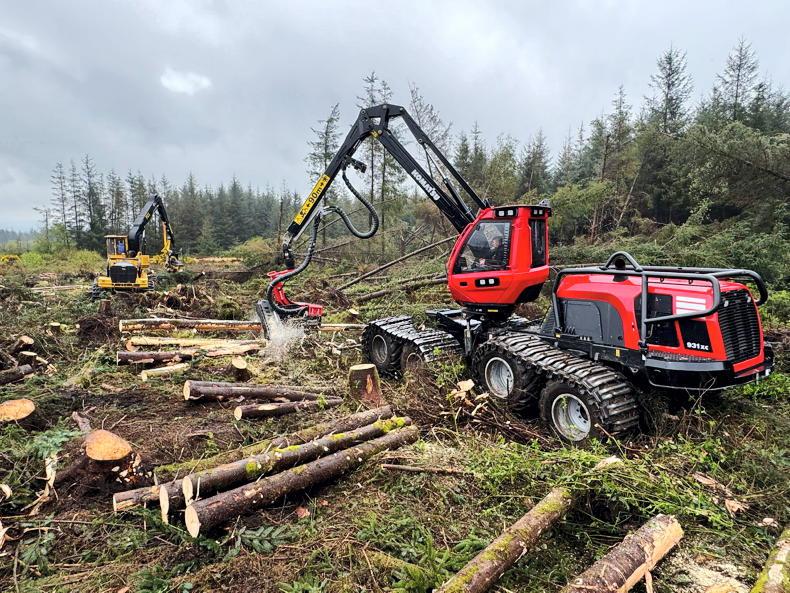Despite Brexit and COVID-19, timber prices are performing remarkably well. The average log price achieved by Coillte for the third quarter this year was €72/m3. This is well above the average price recorded since 2015 and just below the exceptionally high prices achieved in 2018 (Figure 1).
Unfortunately for both Coillte and private growers, increased prices are not matched by increased sales. The high prices mask the artificial market situation created by a major fall in timber availability since late last year.
This is due to a dearth of felling licences, as licence appeals reached record levels throughout the year. The enactment of the Forestry (Miscellaneous Provisions) Act 2020, which aligns forestry licensing with other planning processes, will help alleviate licence blockages.
However, as Mark McAuley of Forest Industries Ireland pointed out to the joint Oireachtas committee last week, there are over 2,000 licences still in the system awaiting approval. While this number includes afforestation, the lack of felling and roading licence approvals is a major problem for the forestry and forest products sector.
Demand for construction timber and pallet in particular – for food and pharmaceutical packaging – are robust. The irony, according to a sawmill spokesperson, is that the self-inflicted wounds of licence appeals are causing more damage to the industry than Covid-19 and Brexit combined.
Coillte sales
Timber prices provided by Coillte are based on auction sales. Although Coillte was unable to hold auctions in the first quarter this year due to a shortage of felling licences, the upward trend in prices is consistent since the end of 2019. So, on the surface, the picture appears positive for Coillte based on high log prices, but this is offset by the dramatic fall in log sales.
Sawmills continue to import logs from Scotland and some sawn timber from the continent where there is a glut of timber due to spruce bark beetle damage.
But these go nowhere near bridging the supply gap, the sawmill spokesperson said. The increased supply of private timber sales has also been closed due to licence appeals.
Coillte’s log prices are for category 0.275m3 and upwards – medium to large sawlog. While information is missing for some large sawlog sizes, Coillte’s prices are up by 30% when average prices for the third quarters of 2020 and 2019 are compared (Table 1).
As Coillte retains small logs for its boardmills, prices are not available from the company for sales in the 0.074m3 to 0.274m3 size categories, but overall strong prices are likely to be reflected in the small tree sizes, mainly for first and second thinning.
Private sales
Private forest owners rely on data for small tree sizes from the confidential wood price quarterly (WPQ) price survey conducted by UCD on behalf of the Irish Timber Growers Association (ITGA). The average price for the three small log categories (0.074m3 to 0.174m3) recorded during the third quarter last year was €17 compared with €24 for the same period this year, an increase of over 40%.
It should be pointed out that the WPQ price information is sourced from a small number of sales, so it may not always reflect real trends.
There is little reason to doubt that prices of small material are up, as demand for pulpwood for both wood-based panels and energy remains solid.
In addition, the shortage of felling licences is probably more acute for private forest owners than Coillte. Private growers are likely to need forest roads for access, which are also held up due to appeals. The requirement of a natura impact statement (NIS), which can cost up to €1,500, is “a major and unfair deterrent in applying for licences” according to Geraldine O’Sullivan of the IFA.
Prices in the medium to large sawlog categories have fallen for the private sector, but there is no reason why forest owners cannot achieve prices similar to Coillte for comparative sales. However, there are a number of reasons why Coillte prices are higher.
Private sales include a wider basket of products than Coillte, including lower-value small pulpwood logs. These are not included in Coillte prices as the company has a buyback or retention clause to ensure a continuous supply of small logs for the company’s two Medite Smartply board mills.
Coillte also has inherent advantages including economies of scale in assembling large-scale lots for sale. Coillte is also better prepared and resourced to secure felling licences.
The IFA and Western Forestry Co-op have called for grant aiding NISs, which they believe would help small-scale private forest owners achieve felling licences.
In the meantime, forest owners who are lucky to have felling licences for thinnings or final harvest, should seriously consider selling.
Opinion: Clarification on Mackinnon required
Despite repeated assurances by Ministers Charlie McConalogue and Pippa Hackett about the Mackinnon review, there is growing doubt about its future, including the appointment of an independent chairperson to oversee its implementation.
One year after the Mackinnon review was submitted, Minister McConalogue recently said a chairperson would be appointed to “report on the feasibility of implementing the Mackinnon recommendations”. A number of forestry spokespersons now fear the Mackinnon review and the role of the independent chairperson will be watered down.
They are concerned that Minister McConalogue only discussed the “feasibility” of implementing Mackinnon rather than actual implementation.
Ministers Hackett and McConalogue need to provide clarification on the review’s current status.
They also need to be reminded that implementation of Mackinnon was promised in the programme for government.
Otherwise, it is difficult to argue against the sceptical view expressed last week by Peter O’Brien, chair of the forestry group in Forest Industries Ireland. O’Brien bluntly told the Joint Committee on Agriculture and the Marine he believed the Mackinnon review “has been buried”.










SHARING OPTIONS